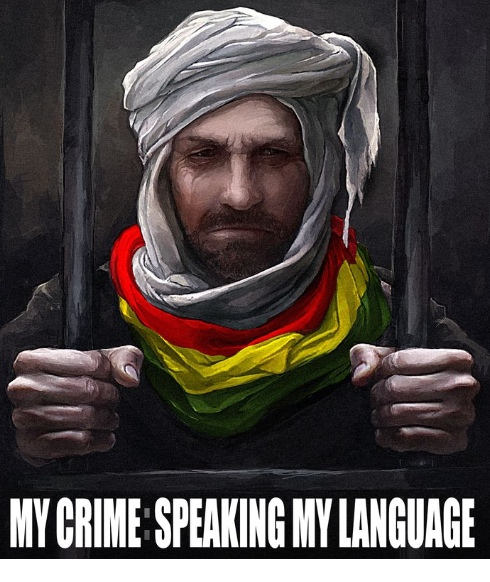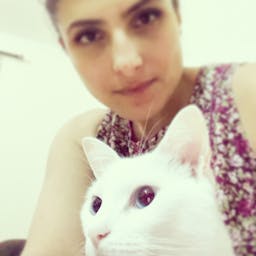The Rise of The Kurds
Jan 21, 2015
Story

Like many Kurdish people in Syria, I lived between two worlds and was treated as a second-class citizen. My family was one of many families going through a transitional phase between Kurdish ethnicity and endeavors to melt us into another ethnicity. Both Syrian society and government pushed us to integrate with the majority in Syria, but without fully accepting us.
As a young girl I was in school I used to omit the last letter in my surname so I would not be exposed to mockery. It was hard for me to be Kurdish. Many Kurd-haters wanted to obliterate everything that makes me a Kurd. As I became a young woman, those who hated my people had nearly succeeded in getting me to turn me on my own people, and to brainwash me. I began to detach myself away to avoid being called a traitor by the majority of society.
But a turning point in my life came when my grandfather passed away. At that time something changed in me and I started to search for what makes me a Kurd.
In Syria, anyone who seeks to learn the Kurdish language is considered a traitor, Syrian security forces insist that, "If there is education, then it is an organization." My attempts to learn my own language were doomed to fail because I felt guilty about putting my Kurdish teacher in danger.
One day a man came to my work place in Damascus, and asked where I came from. When I told him that I was a Kurd, He looked astonished. He could not believe that I was Kurdish because he thought that we are all uneducated. Such views are endorsed and supported excessively by the Syrian Baath party. A party that has racist opinions.
Kurds are the largest minority in Syria, but there are no exact statistics on the number of Kurds in Syria because the Syrian government refuses to acknowledge many Kurds or to conduct a census for us, but we are estimated to compose 10% of the population. The number of Kurds in Syria is smaller than the number of Kurds in Turkey, Iraq and Iran, and we are mainly located in the north and northern east of Syria. There are a small number of Kurds living in the capital Damascus; many of them settled in it during the reign of Ayyubids dnasty - dynasty from Kurdish origins- which ruled most of the Middle East during the 12th and 13th centuries.
Kurds have suffered outrageous acts of oppression in Iraq, Iran, Turkey and Syria including mass murder, suppression of language rights and exploitation of Kurdish resources. Kurds were also forced into poverty and deprived of education and national citizenship. Because many Kurds in Syria were denied the Syrian nationality, as a result of that they were trapped in Syria and stripped from all rights. For the Syrian government, it is as though Kurds do not exist.
Though all Kurds are treated in a discriminatory manner, but the stateless Syrian Kurds estimated to number 200,000 people, have suffered more because they were not allowed able to travel, continue their education or get medical treatment in public hospitals.
The Human Rights Watch report entitled “The Silenced Kurds", states that during the 1962 census 120,000 Kurds were stripped of their nationality. The pretext of the government for this act was to identify "alien infiltrators". The census arbitrarily classified brothers from the same family and born in the same village were classified differently. This was the beginning of the attempts to Arabize the resources-rich northeast of Syria. As a result of this census, many marriages were not recognized by the state and the stateless Kurds were not allowed to own property, deprived from getting any passports and thus the freedom of movement.
Heyam Aqil, a Kurdish activist living in London told me that a Kurdish woman suffering from breast cancer and unable to afford treatment in a private hospital, was prevented from getting treatment in Syrian public hospitals because she was one of the stateless Kurds.
But even the Syrian Kurds who kept their citizenship were not considered lucky; the Syrian authorities could strip them from their nationality if they appeared not as loyal as they should be to the regime. Many students were arbitrarily expelled from their universities and schools, and some employees working in governmental institutes were fired from their jobs. In addition, Kurdish men are not allowed to go to a military school or be promoted to high military ranks.
Like men, Kurdish women suffered from political oppression, but they also suffered from social prejudice from Kurdish men. The attempts of authorities in countries where Kurds live in to dissolve other ethnicities in society changed some social conducts in the Kurdish society itself which started to dominate the social habits and traditions in the countries Kurds live in.
Some negative practices and habits sneaked into the Kurdish culture, like honor killing and limiting women's freedoms. Kurdish women paid the price twice, they were subjected to prosecution and imprisonment, and at the same time they were denied from many rights by their communities. In my village, many girls were able to get their elementary education, but rarely allowed to continue to higher levels of education.
Arranged marriages are common in the Kurdish society, so women must marry whom their families choose. Most of my female cousins married this way. I still remember my cousin Guleh when she was combing her hair in our house many years ago before she traveled to another country to marry a man she had never met before. But most women accept this as part of their costumes, “The Kurdish woman is devoted to her family no matter what level of education she reached or from which social rank she came from. She fights for her people," the activist Heyam said. Women literally fight for their people, and women fought hard to prove that they are as able as men. Some Kurdish women joined "The Pêşmerge Force for Women" in Iraq, or the PKK women fighters in Turkey and Syria who live in mountainsides and seek to be known for their womanly strength. These strong women were always compared to the Amazons. Though hese women are allowed to join armed forces in remote areas, but usually they are not allowed to trave for work or education in remote areas. But still, it is notable that the Kurdish society in the recent years is taking massive steps toward more gain of political rights, human rights and women rights.
Historically, Kurdish women used to assumed power in their communities and ran the affairs of their tribes. Kurdish women enjoyed more freedom than their counterparts like Arabs, Persians and Turkish women. Matriarchal and patriarchal authority could both be found. Kurdish women also once played more notable roles, for instance, Asenath Barzani was one of the first female Rabbis in history. Though assuming power by Kurdish women decreased and some women lost many rights through the years; today Kurdish women engage in social activities like work, dancing and singing equally with men. I still enjoy the memory of weddings in my village where men and women held hands in a big circle to perform the local dance.
The recent uprising in Syria brought more respect to Kurds after they joined all components of Syrian society in the movement for change. "They want to be part of the march for rights, and participate in the formation of a new constitution for Syria where Kurds' rights are recognized," Heyam said. In 2004, a major unrest broke out in the Kurdish inhabited areas in Syria. The regime used all means possible in its crackdown against the Kurds, and in the years after the regime incited hatred against Kurds as traitors and enemies. Kurdish women were a major part of the unrest, because for years, many young Kurdish soldiers were brought dead to their families for unknown reasons. The Kurds were not perceived as humans by the Syrian regime and could be shot by army officers without explanation.
In my conversation with activist Heyam she told me that things changed a lot for women after the unrest in 2004. Women and men joined hands against the oppression they were facing. In 2006, the Kurdish Women’s Union was created to defend women rights and spread awareness, empower women and society. Kurdish women started to engage in their society and their life much more than before.
At the beginning of the revolution, the Syrian regime tried to bribe Kurds, as well as other minorities. Minority rights were denied for decades and only recently did the regime decided to recognize their rights and not harm them in an attempt to turn the Syrian society on each other and isolate the Arab Muslim Sunni. The regime wants to claim that what it is facing is not a revolution, but a sectarian strife were the Arab Muslim Sunni rebels wants to kill other sects and ethnicities. The Kurds insisted on joining the revolution, and their participation in the wheel of change shattered the regime's claims of any sectarian strife.
Heyam Aqil says that inside Syria Kurdish women and men are organizing fund raising, marching to topple the government and forming the "Kurdish National Council" as the framework for the future political life. Heyam told me that those who live outside Syria are also working where they live in to spread awareness about their rights and urge governments to act and support the Syrian people. Heyam said that Kurds often organize protests in front of Syrian embassies, meeting with officials and lawyers to explain their struggle.
The voices of the Kurds are rising. In the recent years, thousands of organizations and forums specialized in Kurdish affairs and rights were established. Our determination crossed years of pain and struggle till we reached the age of web 2.0 where our voices can reach. The existential fight of the Kurds as a nation taught every Kurdish man and woman to speak up and face challenges. Almost every Kurdish individual is a proud messenger that always seeks to deliver his/her spirit and culture.
Some Kurds, like me, might get confused about their identity, they might let go part of their inner soul, might lose confidence under pressure. But the moment I embraced the essence of my nation, I breathed.
This piece is part of my recognition and appreciation of being a Kurd; an attempt to celebrate my Kurdish spirit.
This article is part of a writing assignment for Voices of Our Future a program of World Pulse that provides rigorous new media and citizen journalism training for grassroots women leaders. World Pulse lifts and unites the voices of women from some of the most unheard regions of the world.




